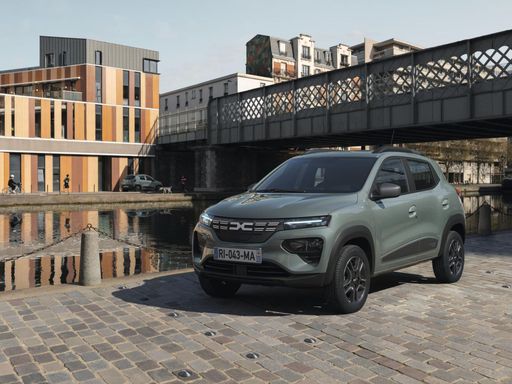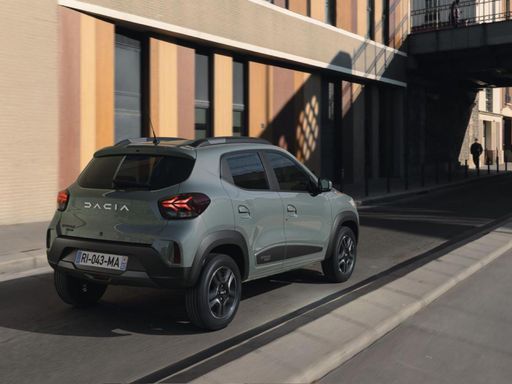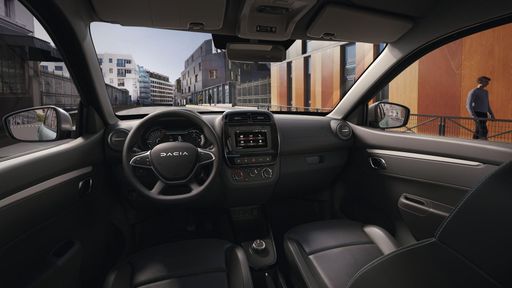Dacia Spring vs Toyota C-HR – Which car suits you better?
Compare performance, boot capacity, efficiency and price at a glance.
Find out which car is the better choice for you – Dacia Spring or Toyota C-HR?
Costs and Efficiency: Looking at overall running costs, both models reveal some interesting differences in everyday economy.
Dacia Spring has a convincingly advantage in terms of price – it starts at 14500 £, while the Toyota C-HR costs 29100 £. That’s a price difference of around 14649 £.
As for range, the Dacia Spring performs convincingly better – achieving up to 228 km, about 160 km more than the Toyota C-HR.
Engine and Performance: Under the bonnet, it becomes clear which model is tuned for sportiness and which one takes the lead when you hit the accelerator.
When it comes to engine power, the Toyota C-HR has a clearly edge – offering 223 HP compared to 65 HP. That’s roughly 158 HP more horsepower.
In acceleration from 0 to 100 km/h, the Toyota C-HR is convincingly quicker – completing the sprint in 7.40 s, while the Dacia Spring takes 13.70 s. That’s about 6.30 s faster.
In terms of top speed, the Toyota C-HR performs evident better – reaching 180 km/h, while the Dacia Spring tops out at 125 km/h. The difference is around 55 km/h.
Space and Everyday Use: Cabin size, boot volume and payload all play a role in everyday practicality. Here, comfort and flexibility make the difference.
Seats: Toyota C-HR offers to a small extent more seating capacity – 5 vs 4.
In curb weight, Dacia Spring is decisively lighter – 1013 kg compared to 1505 kg. The difference is around 492 kg.
In terms of boot space, the Toyota C-HR offers evident more room – 447 L compared to 308 L. That’s a difference of about 139 L.
In maximum load capacity, the Toyota C-HR performs to a small extent better – up to 1155 L, which is about 151 L more than the Dacia Spring.
When it comes to payload, Toyota C-HR clearly perceptible takes the win – 425 kg compared to 302 kg. That’s a difference of about 123 kg.
Who wins the race?
The Toyota C-HR proves to be is largely superior and therefore becomes our DriveDuel Champion!
Toyota C-HR is the better all-rounder in this comparison.

Toyota C-HR
Dacia Spring
The Dacia Spring stands out as an affordable and environmentally friendly option in the electric vehicle market, combining practicality with a compact design ideal for urban settings. Its minimalist interior, while basic, provides all the essential features needed for a comfortable drive, reflecting its cost-effective approach. The vehicle's performance suits city driving, making it an appealing choice for those seeking an entry-level electric car.
details @ dacia-presse.de
@ dacia-presse.de
 @ dacia-presse.de
@ dacia-presse.de
 @ dacia-presse.de
@ dacia-presse.de
Toyota C-HR
The Toyota C-HR stands out with its distinctive and bold design that combines sleek, angular lines with a sporty posture. Its comfortable and stylish interior is equipped with advanced technology features, providing a seamless driving experience. The vehicle offers impressive handling and performance, making it a compelling choice for those who appreciate a blend of practicality and flair on the road.
details @ Toyota
@ Toyota
 @ Toyota
@ Toyota
 @ Toyota
@ Toyota
 @ Toyota
@ Toyota
 @ Toyota
@ Toyota

|

|
|
|
|
Costs and Consumption |
|
|---|---|
|
Price
14500 - 17100 £
|
Price
29100 - 42800 £
|
|
Consumption L/100km
-
|
Consumption L/100km
0.8 - 5.1 L
|
|
Consumption kWh/100km
13.2 - 14.1 kWh
|
Consumption kWh/100km
-
|
|
Electric Range
225 - 228 km
|
Electric Range
68 km
|
|
Battery Capacity
26.80 kWh
|
Battery Capacity
-
|
|
co2
0 g/km
|
co2
17 - 115 g/km
|
|
Fuel tank capacity
-
|
Fuel tank capacity
43 L
|
Dimensions and Body |
|
|---|---|
|
Body Type
SUV
|
Body Type
SUV
|
|
Seats
4
|
Seats
5
|
|
Doors
5
|
Doors
5
|
|
Curb weight
1013 - 1050 kg
|
Curb weight
1505 - 1755 kg
|
|
Trunk capacity
308 L
|
Trunk capacity
350 - 447 L
|
|
Length
3701 mm
|
Length
4362 mm
|
|
Width
1583 mm
|
Width
1832 mm
|
|
Height
1519 mm
|
Height
1558 - 1564 mm
|
|
Max trunk capacity
1004 L
|
Max trunk capacity
1076 - 1155 L
|
|
Payload
265 - 302 kg
|
Payload
375 - 425 kg
|
Engine and Performance |
|
|---|---|
|
Engine Type
Electric
|
Engine Type
Full Hybrid, Plugin Hybrid
|
|
Transmission
Automatic
|
Transmission
Automatic
|
|
Transmission Detail
Reduction Gearbox
|
Transmission Detail
CVT
|
|
Drive Type
Front-Wheel Drive
|
Drive Type
Front-Wheel Drive, All-Wheel Drive
|
|
Power HP
44 - 65 HP
|
Power HP
140 - 223 HP
|
|
Acceleration 0-100km/h
13.7 - 19.1 s
|
Acceleration 0-100km/h
7.4 - 9.9 s
|
|
Max Speed
125 km/h
|
Max Speed
175 - 180 km/h
|
|
Torque
113 - 125 Nm
|
Torque
-
|
|
Number of Cylinders
-
|
Number of Cylinders
4
|
|
Power kW
33 - 48 kW
|
Power kW
103 - 164 kW
|
|
Engine capacity
-
|
Engine capacity
1798 - 1987 cm3
|
General |
|
|---|---|
|
Model Year
2024
|
Model Year
2024 - 2025
|
|
CO2 Efficiency Class
A
|
CO2 Efficiency Class
C, B
|
|
Brand
Dacia
|
Brand
Toyota
|
What drive types are available for the Dacia Spring?
The Dacia Spring is available as Front-Wheel Drive.
The prices and data displayed are estimates based on German list prices and may vary by country. This information is not legally binding.
